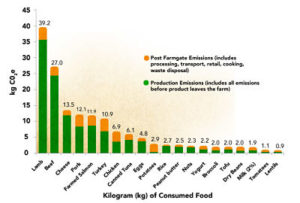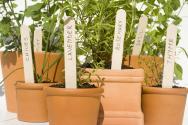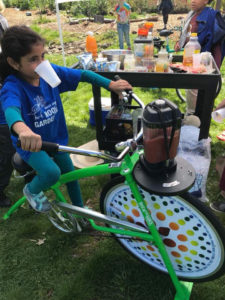Simple Secrets for Sustainable Living
By Tayler Jenkins
The effort to live a more environmentally sustainable lifestyle can sometimes feel daunting. Admittedly, there have been moments that I’ve wondered: Is it worth the effort? What I’ve learned over time is that small efforts can make a big impact. When we make simple sustainable choices every day, even seemingly small efforts add up and often inspire others to do the same, effectively multiplying our impact.
Architect Richard Rogers says, “The only way forward, if we are going to improve the quality of the environment, is to get everybody involved.” Indeed, every bit that we do in our daily lives plays a role in bringing humankind that much closer to a healthier world for us and, importantly, future generations. The ideas I’ve listed below are simple to integrate, yet can substantially reduce your impact while also increasing awareness of the direct and indirect effects that your actions have on the world around you. The following are 4 concepts to consider in jour journey to more sustainable living.
Recycle, Upcycle, and Prevent Waste
According to the EPA, 80 percent of what we throw away in the U.S. is recyclable. Yet, our country’s recycling rate is only 28 percent. Recycling is a well-established way to reduce one’s impact because it diverts waste from landfills and may prevent new materials from being created.
Better yet, can you find way to consume less in general? For example, avoid buying anything you don’t actually need (or, buy it secondhand). Another fun and creative way to consume less is to try reusing or upcycling your old things. You could turn wine bottles into DIY decorations, or revamp an old T-shirt by cutting it into a tank top.
Perhaps one of the easiest and most important things you can do is say goodbye to plastic single-use items. If you don’t already have one, invest in a reusable beverage container and reusable utensil that you can carry around with you. Ever since I started carrying my spork in my bag, I haven’t had to use any plastic utensils.
Speaking of waste, did you know that 40 percent of our food is wasted? That’s 20 pounds of food per person per month (NRDC)! We can drastically reduce this number by only purchasing what we feel confident we will actually eat, saving leftovers for later, and composting anything we won’t eat. Compost is great for your garden, or if you don’t grow your own food you can give it to a friend or neighbor that does.
Eat Consciously
Beyond eliminating food waste, there are other food choices you can make to reduce your impact. The Environmental Working Group completed life cycle assessments for different types of meats and other foods. They found that meat and dairy production have a greater environmental footprint than production of plant-based foods, with lamb and beef having the highest carbon dioxide emissions by far (Read more about their study here).

Kilograms of carbon dioxide released into the atmosphere per kilogram of food. From EWG.org
Try having one meat-free day and, if it resonates with you, you might think about avoiding meat once per week (Meatless Mondays, anyone?). If you don’t want to give up all meat, consider cutting out just red meat, which is associated with a larger carbon footprint than other meats. Minimizing meat intake is a tangible and quantifiable thing you can do to reduce your environmental impact, plus may come with health benefits when done intentionally. Consider it a win-win for your body and the environment!
What about food sourcing? Pesticides from conventionally-grown food contribute to negative environmental impacts since they can run into streams and bodies of water. Buying organic food or growing your own food without the use of pesticides is another way that you can support practices that are beneficial to the environment rather than detrimental. Additionally, eating locally can reduce emissions related to food miles (the number of miles food travels to reach your plate).

Growing herbs is a great place to start if you are new to gardening.
Reduce your Carbon Footprint
Carbon emissions from burning fossil fuels are a major contributor to greenhouse gases in the atmosphere, which contribute to climate change. Try riding a bicycle or taking public transportation instead of driving to the places you need to go. Automobiles are among the largest sources of carbon emissions, so choosing an alternative mode of transportation is a great way to make a significant difference (not to mention saving money from going down your gas tank).

Bicycling instead of driving prevents carbon dioxide emissions as well as promotes a healthy lifestyle.
Did you know that your appliances use energy when they’re plugged in, even when they are turned off? This is called “phantom load,” and you can prevent it by unplugging electronics when not in use. Another easy way to reduce your energy impact is by simply making sure to turn off the lights when leaving a room.
If everyone lived the way you do, how many Earths would it take to sustain the human population? This measurement is called your carbon (or environmental) footprint, and you can actually calculate it yourself through an assessment of various aspects of your lifestyle. A great tool for this is the minibuk How Green Am I? which you can find here. Or, try this carbon footprint calculator from The Nature Conservancy.
Conserve Water
The excessive amount of water we use in cities can be stressing to the water supply, especially in dry climates. Little things like taking shorter showers or turning off the water while soaping up or brushing your teeth can save gallons of water every day. Did you know that showering with a normal shower head uses 7 gallons of water per minute, and running the faucet in your sink uses 3 gallons of water per minute? That can add up quickly! Switching to a low-flow shower head reduces the water usage from 7 to 2.5 gallons per minute (Franklin Institute).
If you live in a dry climate, you may consider how much water is being used on your lawn and rethink your landscape options. For desert gardeners, it may be a good idea to invest in crops that are not water-intensive, such as fava beans or other native desert plants.
Most of all, simply notice when you are using water at times or in places that it isn’t necessary. Consider this mindset shift: If you don’t do this already, think of yourself as a steward of the Earth. Can you embody that mentality throughout your day-to-day life? It’s all about creating habits. Don’t try to do everything at once. Choose just a few that speak to you and try them out. The ones that work for you will stick. Make riding your bike to work a regular routine. Vow to shorten your showers by a few minutes every time until you reach a goal of 5 minutes (or less?). Bring that sleek tumbler with you when you go out for your daily coffee, and keep building up that nutrient-rich compost with your food scraps.
This world needs people bold enough to break the status quo. So, let this be your kickoff point for a long, fruitful journey in environmental awareness. Your actions will help to create a better world for our fellow humans and all of life on Earth.
 Tayler is an Arizona native living in Portland, OR. A self-proclaimed “real foodie,” Tayler has done extensive research on food systems and took a leading role in activism on her college campus to spread education and awareness about healthy, ethical food. In 2013, she lived on a permaculture farm in Nepal conducting research on conservation farming and local food system governance. Tayler received a BS in Sustainability from Arizona State University in 2015 and is the operations manager for Urban Farm U and editor of two newsletters: Urban Farm Lifestyle and The Permaculture Life. She intends to use these as a medium for sharing knowledge and generating interest in urban farming and sustainability. Tayler can be reached at Tayler@urbanfarm.org.
Tayler is an Arizona native living in Portland, OR. A self-proclaimed “real foodie,” Tayler has done extensive research on food systems and took a leading role in activism on her college campus to spread education and awareness about healthy, ethical food. In 2013, she lived on a permaculture farm in Nepal conducting research on conservation farming and local food system governance. Tayler received a BS in Sustainability from Arizona State University in 2015 and is the operations manager for Urban Farm U and editor of two newsletters: Urban Farm Lifestyle and The Permaculture Life. She intends to use these as a medium for sharing knowledge and generating interest in urban farming and sustainability. Tayler can be reached at Tayler@urbanfarm.org.
*Disclosure:
Some of the links in our podcast show notes and blog posts are affiliate links and if you go through them to make a purchase, we will earn a nominal commission at no cost to you. We offer links to items recommended by our podcast guests and guest writers as a service to our audience and these items are not selected because of the commission we receive from your purchases. We know the decision is yours, and whether you decide to buy something is completely up to you.








Great article. I love to read other peoples takes on what little things that can be done each day to reduce, reuse and recycle to improve our planet. Thank you for sharing!